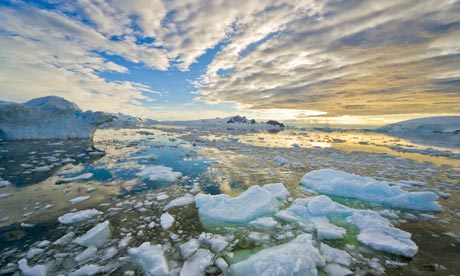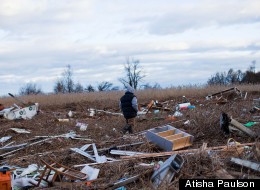 The mystery of the expansion of sea ice around Antarctica, at the same time as global warming is melting swaths of Arctic sea ice, has been solved using data from US military satellites.
The mystery of the expansion of sea ice around Antarctica, at the same time as global warming is melting swaths of Arctic sea ice, has been solved using data from US military satellites.
Two decades of measurements show that changing wind patterns around Antarctica have caused a small increase in sea ice, the result of cold winds off the continent blowing ice away from the coastline.
Poles apart: satellites reveal why Antarctic sea ice grows as Arctic melts
Fracking Runs Afoul of Hometown U.S.A.
 Filled with nostalgia for hot days and salty sweet Cracker Jacks, each year hundreds of thousands of baseball fans make the pilgrimage to this tiny village in the northern Catskill Mountains to celebrate America's oldest past time.
Filled with nostalgia for hot days and salty sweet Cracker Jacks, each year hundreds of thousands of baseball fans make the pilgrimage to this tiny village in the northern Catskill Mountains to celebrate America's oldest past time.
But Cooperstown's draw goes beyond Doubleday Field and the National Baseball Hall of Fame. Its rustic yet sophisticated charm lures city dwellers and out-of-state homesteaders craving fresh air, rural landscapes and down-home attractions. Spend a day in Cooperstown and it's easy to see why novelist James Fenimore Cooper immortalized it in The Leatherstocking Tales.
Hurricane Sandy Damage Amplified By Breakneck Development Of Coast
 Given the size and power of the storm, much of the damage from the surge was inevitable. But perhaps not all. Some of the damage along low-lying coastal areas was the result of years of poor land-use decisions and the more immediate neglect of emergency preparations as Sandy gathered force, according to experts and a review of government data and independent studies.
Given the size and power of the storm, much of the damage from the surge was inevitable. But perhaps not all. Some of the damage along low-lying coastal areas was the result of years of poor land-use decisions and the more immediate neglect of emergency preparations as Sandy gathered force, according to experts and a review of government data and independent studies.
Authorities in New York and New Jersey simply allowed heavy development of at-risk coastal areas to continue largely unabated in recent decades, even as the potential for a massive storm surge in the region became increasingly clear.
4.3 magnitude earthquake reported in Kentucky
 The U.S. Geological Survey is reporting that an earthquake centered in Kentucky also rattled other nearby states.
The U.S. Geological Survey is reporting that an earthquake centered in Kentucky also rattled other nearby states.
The USGS website says the epicenter of the 4.3 magnitude earthquake on Saturday afternoon was about 10 miles (16 kilometers) west of Whitesburg. Residents in nearby Virginia, West Virginia, Tennessee, North Carolina, South Carolina, Indiana, Ohio and Georgia also reported feeling the temblor.
TVNL Comment: Once again, earthquake activity is reported in a region where hydraulic fracfking for natural gas is taking place. The connection between fracking and earthquakes has been established by many studies. But it will take a major disaster for people to wake up.
New Report Shows Radioactive Threat to New York if Fracking Approved
 A new report issued by Grassroots Environmental Education, a New York-based non-profit organization and authored by a former staff scientist for the National Council on Radiation Protection says that horizontal hydrofracking in the Marcellus Shale region of New York State is likely to produce significantly higher amounts of radioactive waste than previously believed, putting New Yorkers in danger, and that the New York State Department of Environmental Conservation has not demonstrated the ability to properly analyze the potential impact of radiation exposure or take adequate steps to protect the public.
A new report issued by Grassroots Environmental Education, a New York-based non-profit organization and authored by a former staff scientist for the National Council on Radiation Protection says that horizontal hydrofracking in the Marcellus Shale region of New York State is likely to produce significantly higher amounts of radioactive waste than previously believed, putting New Yorkers in danger, and that the New York State Department of Environmental Conservation has not demonstrated the ability to properly analyze the potential impact of radiation exposure or take adequate steps to protect the public.
“Once radioactive material comes up out of the ground along with the gas, the problem is what to do with it,” says Doug Wood, associate director of Grassroots Environmental Education, who edited the report. “The radioactivity lasts for thousands of years, and it is virtually impossible to eliminate or mitigate. Sooner or later, it’s going to end up in our environment and eventually our food chain. It’s a problem with no good solution—and the DEC is unequipped to handle it.”
Warmer still: Extreme climate predictions appear most accurate, report says
 Climate scientists agree the Earth will be hotter by the end of the century, but their simulations don’t agree on how much. Now a study suggests the gloomier predictions may be closer to the mark.
Climate scientists agree the Earth will be hotter by the end of the century, but their simulations don’t agree on how much. Now a study suggests the gloomier predictions may be closer to the mark.
“Warming is likely to be on the high side of the projections,” said John Fasullo of the National Center for Atmospheric Research in Boulder, Colo., a co-author of the report, which was based on satellite measurements of the atmosphere.
Ballot Question 300: Longmont fracking ban storms to victory
As of 11 p.m. Tuesday, the ban — Ballot Question 300 — was leading 16,798 votes to 11,544 and had widened its margin of victory with every report, according to the Boulder and Weld county clerk's offices. That gave ban supporters about 59 percent of the vote.
“Are you kidding?” screamed ban supporter Teresa Foster as results came in to a watch party held by Our Health, Our Future, Our Longmont. “Awesome! Yeah! Yeah! Yeah!”
Hurricane Sandy’s Unmistakable Message
 While politicians play for votes and ignore the evidence of a rapidly changing climate, Mother Nature has made the consequences heartbreakingly clear.
While politicians play for votes and ignore the evidence of a rapidly changing climate, Mother Nature has made the consequences heartbreakingly clear.
Four days after 24-year old Jake Vogelman was killed by a hurricane-toppled tree, NYPD detectives came to his house with his personal effects: a black leather wallet still wet from the rain and a watch that was still working
Removing the green cloak from natural gas
For decades, natural gas (methane) has been touted as a greener energy alternative to coal, when, according to a new Cornell University study, in considering its whole lifecycle, natural gas appears to be worse for climate change than the coal industry and is more toxic to the environment and human health.
The driver of gas' green halo is true: methane burns cleaner than coal, thus contributing less to global warming during combustion. However, the hydraulic fracturing process — the only way industry knows to get the gas that's left — releases significant amounts of methane, unburned, directly into the atmosphere. When methane isn't burned, it's 20 times more potent a greenhouse gas than carbon dioxide. Combine that with the 1,000 truck trips, on average, 2 million to 8 million gallons of water, and 10,000 to 40,000 gallons of chemicals used per well.
More Articles...
Page 67 of 156

 Environmental News Archive
Environmental News Archive


































